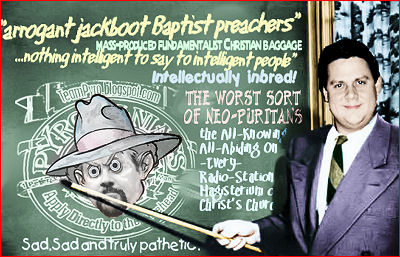by Dan Phillips
Proverbs, by Tremper Longman III (Baker: 2006; 608 pages)
Longman's commentary on Proverbs is the third volume published in the new
Baker Commentary on the Old Testament Wisdom and Psalms series. The series preface (pp. 11-13) identifies the "primary users" as "scholars, ministers, seminary students, and Bible study leaders," with emphasis on "clergy and future clergy, namely, seminary students" (p. 12). Toward this end, the volumes will focus on the books' message. Authors do their own translation, provide explanatory notes, with both interpretive and theological sections.

So how do I give you a feel for a long book, in a relatively short review? Let's check out the features.
First: a very useful introduction to Proverbs (pp. 21-87). This section is very helpful in approaching Proverbs interpretively. I particularly appreciate how Longman puts Proverbs in the canon, and solidly acknowledges its theological orientation and contributions. For instance:
“…the conclusion that the book is not theological is wrong. Proverbs is not rightly understood if it is taken as a book of practical advice with an occasional nod of the head to Yahweh. The book is thoroughly and pervasively theological” (p. 57)
Very well-put.
The section on the theology of Proverbs is quite thought-provoking, and the study of wisdom literature in other nearby cultures adeptly done.
Now, as to Proverbs proper.
Like me, Longman isn't convinced that Proverbs has a "deep structure" providing a larger context even for the two-liners of chapters 10 and following (he grants that some sections seem thematically coherent, but he seems less inclined to see the grouping as hermeneutically meaningful than I).
Unlike me, Longman is agnostic as to authorship. As so many have done, Longman maddeningly says that 10:1 "explicitly connects Solomon to 10:1—22:16," yet
the identical words in 1:1 have no necessary import as to authorship (p. 25). I wonder what Solomon would have had to have written, to convince gents such as Dr. Longman as to authorship. [
UPDATE: I pursue this at great length in
the appendix on authorship in my book.]
Second: as promised, the commentary uses Longman's own translation of Proverbs. I found his rendering interesting, and will refer to it for my own. However, at times it strikes me as a bit
wobbly.
 "Wobbly"?
"Wobbly"? Translational style is both hither, and thither. Sometimes the translations are
woodenly literal. "Yahweh detests stone and stone" (20:23); "Removing a garment on a cold day, vinegar on soda, singing a song to a troubled heart" (25:20); "Lambs, for your clothes, and he-goats, for the price of fields..." (27:26)
On the other hand, sometimes Longman
paraphrases for no apparent reason. Most irritatingly to me,
singulars often are rendered by
plurals ("Go to the ant, you lazy people!" [6:6; verb and noun are singular]; cf. 13:24 [very awkward—first line plural, second singular]; 17:17; 18:24; 26:13-16; 28:25-26, and many others).
Sometimes he's fresh almost to the point of anachronism: "the
tax man tears it down" (29:4; had me humming the Beatles' song [kids, ask your parents]).
What puzzled me for some time, as I read, was why a scholar such as TLIII so frequently refers to the
New Living Translation, which is a pretty rank paraphrase. It was so frequent that I began to wonder whether he'd been involved in the production of that version in some way. Then I found it: Longman was
senior translator for the Wisdom books in the NLT.
Third: the commentary itself. I struggle with what to say about this. Simply and truly, the commentary is mostly good and informative — but it is uneven. Perhaps it depends upon expectations.
Portions are
quite good (such as the section on Proverbs 31:10-31, for instance). Longman virtually always deals with the Hebrew text, comments on the words, documents their meanings and the translation. His thoughts on the "fool" and "wisdom" synonyms are quite helpful, as are his comments on the eschatological possibilities in some of the proverbs. Whether or not you agree with his conclusions, you'll be challenged by Longman's lengthy wrestling with the identity of Woman Wisdom in chapter 8, and other knotty portions and topics. The footnotes and bibliography point the way to further investigation.
At the same time, other comments are disappointing, given the promised focus of the series. For instance, 18:24 is very difficult both to translate and to interpret, yet Longman deals with it in around 45 words. Sometimes one simply has the sense that proverbs have been hurried over rather than chewed over (i.e. 17:12; 27:21). He discusses the difficult 16:4, but doesn't really get to the bottom of it. Even his rendering overlooks the pronominal suffix ("Yahweh makes everything for
a purpose," where the Hebrew has "his" or "its" purpose).

While the text is formally aimed at pastors, I have to say that the approach is more academic than pastoral. (For a modern example of the latter, see
John A. Kitchen's commentary, which I mean to review...eventually.) [
UPDATE: done. Kitchen chews over
everything to the full extent of his ability
.] The pastor will definitely find materials he can use for preaching and counseling, but they will be inferential rather than directed to those ends.
Appendix. Longman has an appendix of topical studies, where he groups and discusses related proverbs under 29 pages' worth of articles. His groupings are not the same as every other such study, and include: Alcohol; Appropriate Expression of Emotions; Business Ethics; Family Relationships; Guidance/Planning/Looking to the Future; Openness to Listening to Advice; Physical Discipline; Psychological Insight — and even Table Manners!
Small, but mighty. Footnotes, not end-notes! Indices! These are
good things!
Less good are a few typos, and aspects of the layout. First the whole chapter is translated, and some textual/translational footnotes are placed here. Then the translation is reproduced verse by verse, with commentary; the reader must page back to the previous footnotes.
Summary. I'd say that
Waltke and
Kidner on Proverbs are two very different
must-haves, for anyone who is seriously interested in diving deep. Longman's volume joins
Duane Garrett's as a
good-to-have: not indispensable, but I'm glad I own it, and will definitely use it in my studies.
Update: I have added some more meandering thoughts over at
my own blog.

The following excerpt is taken from a sermon titled "The Security of Believers; or, Sheep Who Shall Never Perish," originally delivered on Thursday evening, September 5th, 1889, at the Metropolitan Tabernacle, Newington. Spurgeon's text was John 10:27-30 — "My sheep hear my voice, and I know them, and they follow me: and I give unto them eternal life; and they shall never perish, neither shall any man pluck them out of my hand. My Father, which gave them me is greater than all; and no man is able to pluck them out of my Father’s hand. I and my Father are one."
 hey are safe ...by outer injuries being prevented. “Neither shall any man pluck them out of my hand.” Many will pluck at them, but none shall pluck them away. The devil will give many a horrible pluck and pull, to get them away; but out of the great Shepherd’s hand he shall never take them. Their old companions, and the memory of their old sins will come, and pluck at them very hard, and very cunningly; but the Savior says, “None shall pluck them out of my hand.” So, first, here is their security: they are in his hand; that is, in his possession, and he grasps them, as a man holds a thing in his hand, and says, “It is mine.” Neither shall any take them away from
hey are safe ...by outer injuries being prevented. “Neither shall any man pluck them out of my hand.” Many will pluck at them, but none shall pluck them away. The devil will give many a horrible pluck and pull, to get them away; but out of the great Shepherd’s hand he shall never take them. Their old companions, and the memory of their old sins will come, and pluck at them very hard, and very cunningly; but the Savior says, “None shall pluck them out of my hand.” So, first, here is their security: they are in his hand; that is, in his possession, and he grasps them, as a man holds a thing in his hand, and says, “It is mine.” Neither shall any take them away from being under his protection. Never shall they be plucked away from Christ. When he says this, he pledges his honor to preserve them, for if it could be that one were plucked out of his hand, then would the devils in hell rejoice, and say, “He could not keep them. He said that he would, but he could not. We have managed to pluck this one, or that one, out of the pierced hand of their Redeemer.” But such a horrible exultation shall never be heard throughout the ages of eternity. “They shall never perish; neither shall any pluck them out of my hand.”
being under his protection. Never shall they be plucked away from Christ. When he says this, he pledges his honor to preserve them, for if it could be that one were plucked out of his hand, then would the devils in hell rejoice, and say, “He could not keep them. He said that he would, but he could not. We have managed to pluck this one, or that one, out of the pierced hand of their Redeemer.” But such a horrible exultation shall never be heard throughout the ages of eternity. “They shall never perish; neither shall any pluck them out of my hand.”


 Yesterday's reading was in chapter two, amid the letters to seven churches that fill chapters two and three. When I was preparing for a
Yesterday's reading was in chapter two, amid the letters to seven churches that fill chapters two and three. When I was preparing for a 


 (he surely meant before the procedure; not after), so it was an extremely difficult procedure, and he was pretty sure my regular dentist would have had a hard time completing it.
(he surely meant before the procedure; not after), so it was an extremely difficult procedure, and he was pretty sure my regular dentist would have had a hard time completing it.


 Think about that -- if your apologetics were good apologetics, it would change people's minds about you and your work -- not alienate them or put them on the defensive.
Think about that -- if your apologetics were good apologetics, it would change people's minds about you and your work -- not alienate them or put them on the defensive. If all people who were striving to be apologists applied this aspect of Paul's ministry to their own, they'd be different and better people. Another way of thinking about this goes like this: we all know that non-Christians or ex-church people think poorly of Christianity because we are all hypocrites, mean-spirited judgmentalists, fundies in the worst sense, and people who care about money more than we do about anything else. There's no stunner or world-changing revelation in that confession from a non-believer.
If all people who were striving to be apologists applied this aspect of Paul's ministry to their own, they'd be different and better people. Another way of thinking about this goes like this: we all know that non-Christians or ex-church people think poorly of Christianity because we are all hypocrites, mean-spirited judgmentalists, fundies in the worst sense, and people who care about money more than we do about anything else. There's no stunner or world-changing revelation in that confession from a non-believer. See: I think that if we study Scripture long enough, and listen to what it teaches us about ourselves, real humility has to be among the convictions we receive. But to do that -- to become decent apologists who can approach people with the declaration that Jesus is Lord and Christ as Peter did at Pentecost as if it was important but not an insult -- we have to have a decent hermeneutic of Scripture.
See: I think that if we study Scripture long enough, and listen to what it teaches us about ourselves, real humility has to be among the convictions we receive. But to do that -- to become decent apologists who can approach people with the declaration that Jesus is Lord and Christ as Peter did at Pentecost as if it was important but not an insult -- we have to have a decent hermeneutic of Scripture.
 on a number of levels, Chris gives the
on a number of levels, Chris gives the  blitheringly awful we sons of Adam are at self-diagnosis -- should ever let ourselves be intimidated into silence.
blitheringly awful we sons of Adam are at self-diagnosis -- should ever let ourselves be intimidated into silence. by the TeamPyro P.R. Wonk
by the TeamPyro P.R. Wonk
 om Wright has posted a screed on the atonement controversies.
om Wright has posted a screed on the atonement controversies.
 s forgiveness from sin grounded only in the love and mercy and goodness of God—apart from his justice? Does love alone prompt the Almighty to forego the due penalty of sin, wipe out the record of our wrongdoing, and nullify the claims of justice against us, unconditionally?
s forgiveness from sin grounded only in the love and mercy and goodness of God—apart from his justice? Does love alone prompt the Almighty to forego the due penalty of sin, wipe out the record of our wrongdoing, and nullify the claims of justice against us, unconditionally? Or must God Himself be propitiated? In other words, do His righteousness and His holy wrath against sin need to be satisfied before He can forgive?
Or must God Himself be propitiated? In other words, do His righteousness and His holy wrath against sin need to be satisfied before He can forgive? Our thoughts about such things are almost always too shallow. We take God's mercy for granted and ignore His holy justice. But a right view of God will always exalt His righteous hatred for sin as much as it magnifies His love and mercy. God's mercy is not some maudlin sentiment that causes Him to forget about His holiness and set aside His righteous anger against sin. The demands of righteousness must be fully and completely satisfied if God is ever going to forgive sin. He cannot and will not simply overlook sin as if it didn't really matter.
Our thoughts about such things are almost always too shallow. We take God's mercy for granted and ignore His holy justice. But a right view of God will always exalt His righteous hatred for sin as much as it magnifies His love and mercy. God's mercy is not some maudlin sentiment that causes Him to forget about His holiness and set aside His righteous anger against sin. The demands of righteousness must be fully and completely satisfied if God is ever going to forgive sin. He cannot and will not simply overlook sin as if it didn't really matter. The
The  n the excerpt below, Spurgeon was sounding an alarm against early modernist tendencies. Specifically, he was answering those who recoiled from the truth that God requires a blood atonement as the price of forgiveness. "The idea that God must be propitiated by blood makes Him seem too harsh," the modernists argued. Genteel Victorians, whose sensibilities were offended merely by the sound of the word blood, were inclined to agree.
n the excerpt below, Spurgeon was sounding an alarm against early modernist tendencies. Specifically, he was answering those who recoiled from the truth that God requires a blood atonement as the price of forgiveness. "The idea that God must be propitiated by blood makes Him seem too harsh," the modernists argued. Genteel Victorians, whose sensibilities were offended merely by the sound of the word blood, were inclined to agree.



 ell, I did finally manage to connect with
ell, I did finally manage to connect with  it wouldn't be appropriate for me to blog about the particulars. But I will say that although Dan was obviously quite busy, he was friendly and didn't sound rushed. He's a good, thoughtful listener. It was no small sacrifice for him to have such an in-depth conversation with me via phone, and I appreciate that. Dan Kimball seems like a very nice guy.
it wouldn't be appropriate for me to blog about the particulars. But I will say that although Dan was obviously quite busy, he was friendly and didn't sound rushed. He's a good, thoughtful listener. It was no small sacrifice for him to have such an in-depth conversation with me via phone, and I appreciate that. Dan Kimball seems like a very nice guy.
 Last time, we talked about the problem of people who are too doctrinally sound to belong to a church, and much to my surprise there weren’t a lot of objections to my comments. But that said, we closed with the thought that there are people who belong to churches and are still bad apologists – that somehow belonging to a local church doesn’t solve the problem of having more bite and bark than, um, something else.
Last time, we talked about the problem of people who are too doctrinally sound to belong to a church, and much to my surprise there weren’t a lot of objections to my comments. But that said, we closed with the thought that there are people who belong to churches and are still bad apologists – that somehow belonging to a local church doesn’t solve the problem of having more bite and bark than, um, something else. m-w.com says this about apologetics: a branch of theology devoted to the defense of the divine origin and authority of Christianity. What I like about this definition is that it’s simple and direct; what I don't like about it is that somehow it has left off one of the necessary indirect objects. Sure: it’s a branch of theology. Yes: “devoted” is the right verb. Its devotion is “to” the defense “of” Christianity, in terms of Christianity’s divine origin and divine authority.
m-w.com says this about apologetics: a branch of theology devoted to the defense of the divine origin and authority of Christianity. What I like about this definition is that it’s simple and direct; what I don't like about it is that somehow it has left off one of the necessary indirect objects. Sure: it’s a branch of theology. Yes: “devoted” is the right verb. Its devotion is “to” the defense “of” Christianity, in terms of Christianity’s divine origin and divine authority. There is also a third class of apologetics which sort of hangs between these two categories, and it is counter-cult apologetics. Some would argue that counter-cult apologetics is really a form of the first kind of apologetics, and would support that by noting that Mormons and Jehovah’s Witnesses think that they are Christians – or worse, think they are the only Christians. The problem is that their definition of Christ, and God, and all the theological categories of the Bible are so different than what the Protestant apologist would accept that the issues turn out to be far more like the foundational work one has to do in second-type apologetics. It’s hard not to draw the conclusion that one is doing world-view (also called “presuppositional”) apologetics with the cultists.
There is also a third class of apologetics which sort of hangs between these two categories, and it is counter-cult apologetics. Some would argue that counter-cult apologetics is really a form of the first kind of apologetics, and would support that by noting that Mormons and Jehovah’s Witnesses think that they are Christians – or worse, think they are the only Christians. The problem is that their definition of Christ, and God, and all the theological categories of the Bible are so different than what the Protestant apologist would accept that the issues turn out to be far more like the foundational work one has to do in second-type apologetics. It’s hard not to draw the conclusion that one is doing world-view (also called “presuppositional”) apologetics with the cultists. My contention is that most “apologists” don’t have someone like that, but that’s actually the second problem: their pastors or elders don't really care about apologetics. In many ways, that’s why a lot of these people get into apologetics in the first place: they are intellectually-curious people who like to read, and some of them are smart enough to understand what they read, and suddenly they know more about the principles of the Reformation than most third-year seminary students, let alone Bible-college graduates. So they learned on their own about the theology and philosophy of the faith, but they didn’t really get any pastoral guidance about how we now shall live.
My contention is that most “apologists” don’t have someone like that, but that’s actually the second problem: their pastors or elders don't really care about apologetics. In many ways, that’s why a lot of these people get into apologetics in the first place: they are intellectually-curious people who like to read, and some of them are smart enough to understand what they read, and suddenly they know more about the principles of the Reformation than most third-year seminary students, let alone Bible-college graduates. So they learned on their own about the theology and philosophy of the faith, but they didn’t really get any pastoral guidance about how we now shall live. The third (and final) problem I want to uncover today is the problem of objectives. Without the pastoral edge – without the pastoral concern and temperament – we lose sight of the real goal of apologetics: to deliver the Gospel, and tell people that God did not send the Son into the world to judge the world but to save it. Ultimately, our arguments may (as Paul says) have the smell of death to those who are perishing, but we shouldn’t set out on the task intending to stink to high heaven. The idea that men suffer and are sinful but that God Himself has done the work which saves us is a brilliant, beautiful idea, and we ought to present it as the best end – the option in which one can taste and see the goodness of the Lord.
The third (and final) problem I want to uncover today is the problem of objectives. Without the pastoral edge – without the pastoral concern and temperament – we lose sight of the real goal of apologetics: to deliver the Gospel, and tell people that God did not send the Son into the world to judge the world but to save it. Ultimately, our arguments may (as Paul says) have the smell of death to those who are perishing, but we shouldn’t set out on the task intending to stink to high heaven. The idea that men suffer and are sinful but that God Himself has done the work which saves us is a brilliant, beautiful idea, and we ought to present it as the best end – the option in which one can taste and see the goodness of the Lord. because they loved one another (v. 5), and "this is love, that we walk according to his commandments; this is the commandment, just as you have heard from the beginning, so that you should walk in it" (v. 6). Love, walk, commandments, walk.
because they loved one another (v. 5), and "this is love, that we walk according to his commandments; this is the commandment, just as you have heard from the beginning, so that you should walk in it" (v. 6). Love, walk, commandments, walk.









